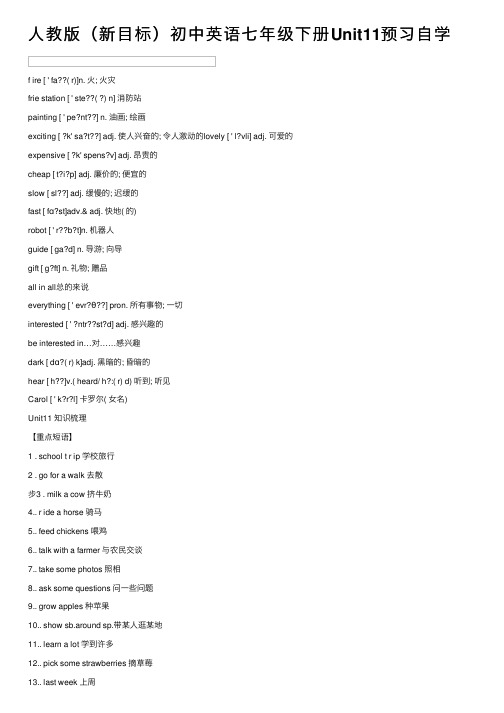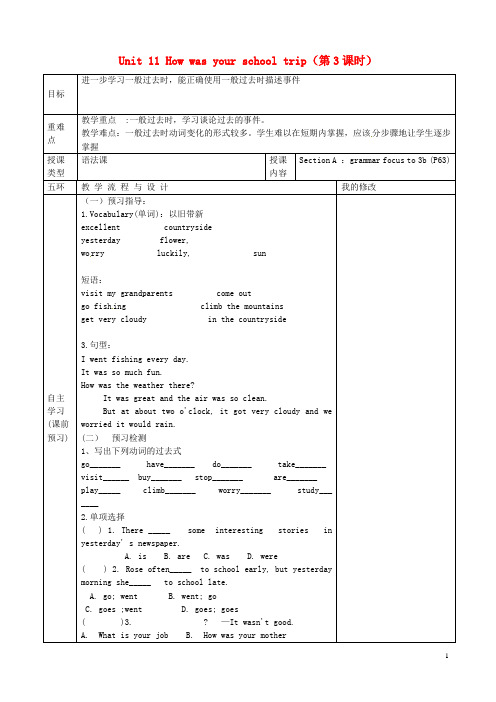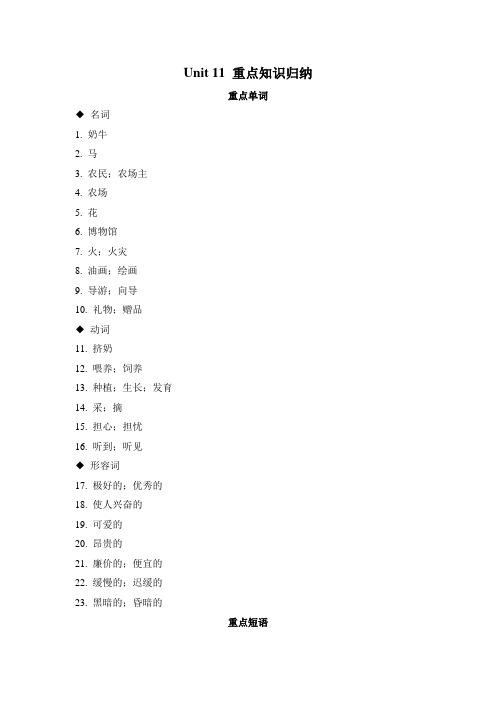新目标七下英语unit11复习学案
人教版(新目标)初中英语七年级下册Unit11预习自学

⼈教版(新⽬标)初中英语七年级下册Unit11预习⾃学f ire [ ' fa??( r)]n. ⽕; ⽕灾frie station [ ' ste??( ?) n] 消防站painting [ ' pe?nt??] n. 油画; 绘画exciting [ ?k' sa?t??] adj. 使⼈兴奋的; 令⼈激动的lovely [ ' l?vli] adj. 可爱的expensive [ ?k' spens?v] adj. 昂贵的cheap [ t?i?p] adj. 廉价的; 便宜的slow [ sl??] adj. 缓慢的; 迟缓的fast [ fɑ?st]adv.& adj. 快地( 的)robot [ ' r??b?t]n. 机器⼈guide [ ga?d] n. 导游; 向导gift [ g?ft] n. 礼物; 赠品all in all总的来说everything [ ' evr?θ??] pron. 所有事物; ⼀切interested [ ' ?ntr??st?d] adj. 感兴趣的be interested in…对……感兴趣dark [ dɑ?( r) k]adj. ⿊暗的; 昏暗的hear [ h??]v.( heard/ h?:( r) d) 听到; 听见Carol [ ' k?r?l] 卡罗尔( ⼥名)Unit11 知识梳理【重点短语】1 . school t r ip 学校旅⾏2 . go for a walk 去散步3 . milk a cow 挤⽜奶4.. r ide a horse 骑马5.. feed chickens 喂鸡6.. talk with a farmer 与农民交谈7.. take some photos 照相8.. ask some questions 问⼀些问题9.. grow apples 种苹果10.. show sb.around sp.带某⼈逛某地11.. learn a lot 学到许多12.. pick some strawberries 摘草莓13.. last week 上周14..In the countryside 在乡村15.. visit my grandparents 拜访我的祖⽗母16.. go f ishing 去钓鱼17.. sound good 听起来很好18.. climb the mountains 去爬⼭19 . play some games 玩⼀些游戏20 . visit a museum 参观博物馆21 .visit a f i re station 参观消防站22 . draw pictures 画画23 . go on a school t r ip 去旅⾏24 visit the science museum 参观科技博物馆25.. how to make a model robot 如何制作机器⼈模型26.. gift shop 礼品店27.. buy sth.for sb. = buy sb.sth. 为某⼈买某物28 .all in all 总得来说29 .be interested in...对… 感兴趣30 .be expensive 昂贵的31 .not. . . at all ⼀点⼉也不【重点句型】1 . --- Did you see any cows? 你见到奶⽜了吗--- Yes,I did.I saw quite a lot.我见到了⽽且见到了很多很多2.. --- Did Carol take any photos?罗尔拍照⽚了吗?--- Yes, she did. 是的,她拍了。
重庆市第110中学校七年级英语下册 Unit 11 How was your school trip(第3课时)教案 (新版)人教新目标版

Unit 11 How was your school trip(第3课时)目标进一步学习一般过去时,能正确使用一般过去时描述事件重难点教学重点 :一般过去时,学习谈论过去的事件。
教学难点:一般过去时动词变化的形式较多。
学生难以在短期内掌握,应该分步骤地让学生逐步掌握授课类型语法课授课内容Section A :grammar focus to 3b (P63)五环教学流程与设计我的修改自主学习(课前预习) (一)预习指导:1.Vocabulary(单词):以旧带新excellent countrysideyesterday flower,wo rry luckily, sun短语:visit my grandparents come outgo fish ing climb the mountains get very cloudy in the countryside3.句型:I went fishing every day.It was so much fun.How was the weather there?It was great and the air was so clean.But at about two o'clock, it got very cloudy and we worried it would rain.(二)预习检测1、写出下列动词的过去式go_______ have_______ do_______ take_______visit______ buy_______ stop_______ are_______play_____ climb_______ worry_______ study_______2.单项选择( ) 1. There _____ some interesting stories in yesterday' s newspaper.A. isB. areC. wasD. were( ) 2. Rose often_____ to school early, but yesterday morning she_____ to school late.A. go; wentB. went; goC. goes ;wentD. goes; goes( )3. ? —It wasn't good.A. What is your jobB. How was your motherC. Are you OKD. How was your weekend ( )4. last summer vacation?—I went to the beach in Hainan.A. What did you doB. When did you go thereC. What do you doD. How did you go there ( )5. —How was your school trip last week?—Pretty good! We_____ the history museumA. visitB. VisitedC. are visitingD. will visit合作学习运用(课中释疑) 1.小组交流句型学习情况,交流预习检测情况。
新目标英语七年级下册讲义—Unit 11 How was your school trip

新目标七年级下册Unit 11 How was your school trip? 讲义一、重点单词k 挤奶2. cow .奶牛3. horse 马4. feed 喂养;饲养5. farmer 农民;农场主6. quite 相当;安全7. anything (常用于否定句或疑问句)任何东西;任何事物8. everything 一切;所有事物9. grow 种植;生长;发育10. farm 农场;务农;种田11. pick 采;摘12. excellent极好的;优秀的13. countryside 乡村;农村14. yesterday 昨天15. flower花16. worry 担心;担忧17. luckily 幸运地;好运地18. sun 太阳19. museum博物馆20. fire 火灾21. painting .油画;绘画22. exciting adj.使人兴奋的;令人激动的23. lovely可爱的24. expensive 昂贵的25. cheap 廉价的;便宜的26. slow缓慢的;迟缓的27. fast 快地(的)28. robot .机器人29. guide 导游;向导30. gift 礼物;赠品31. dark 黑暗的;昏暗的32. hear(heard)听到;听见自测表:二、短语归纳1.school trip 学校旅行2.go for a walk 去散步k a cow 给奶牛挤奶4.ride a horse 骑马5.feed chickens 喂鸡6.talk with 和......交谈7.take photos /a photo拍照st week上周9.ask some questions问一些问题10.quite a lot 相当多11.show sb. around sp.带某人参观某地12.learn about 了解13.grow strawberries种植草莓14.from...to... 从…到…15.pick some strawberries摘草莓16.take sth home带…回家17.climb the mountains 爬山18.visit my grandparents看望我的祖父母19.go fishing 去钓鱼20.so much 如此多的21.go to the zoo去动物园22.go to a farm去农场23a lot of fun很多乐趣24.play games 做游戏e out 出来26.go to the countryside去乡下27.science museum科学博物馆28.visit a museum 参观博物馆29.play chess with sb... 和…下棋30.buy sth for sb为某人买31.be interested in…对…感兴趣32.all in all总的来说33.not...at all 一点也不,根本不三、句型集萃1. How + be…? + like? ……怎么样?2. How do/does+主语+feel about...? 对......感觉如何?3. too many + 可数名词复数太多的……4.teach sb. how to do sth. 教某人怎样做某事5.quite + a / an + 形容词+可数名词单数= a + very + 形容词+可数名词单数一个相当/ 很……6.buy sth. for sb.=buy sb. Sth.为某人买东西7.It’s +形容词+to do sth. 做某事是......的8.sound+形容词听起来......四、词汇、句型讲解及拓展1.How was your school trip?学校旅行怎么样?【解析】How+be+主语?=What be+主语+like?意为“….怎么样?”★★★本句的答语:It was great./It was OK./It was/wasn’t good….【拓展】how是疑问副词,意为“怎么样,怎么”,用来构成特殊疑问句,主要用法如下:1)询问如何做某事,或者做某事方式。
英语人教新目标七年级下册2012年新编Unit11SectionA教案1

word整理版学习参考资料Unit 11 How was your school trip?Section A 1a — 1c (P61)* 教师寄语:A thousand mile trip begins with one step. 千里之行,始于足下。
【学习目标】【学习重点】:学习一般过去时;学会谈论过去事件。
--Did you …? – Yes, I did. / No, I didn't.【体验学习】:I. 预习交流1.根据单元标题和图片等,预测新课内容;2.根据音标拼读单词并牢记;3.自学课文,勾画出重点和疑惑。
II. 翻译官1. school trip_________________2. 散步______________________ 4. 骑马_____________________ 5. 喂鸡______________________ 3. milk a cow ________________ 6. 照相______________________ 7.与农夫交谈________________ 8. quite a lot __________________【课堂导学】:I. 新课呈现Step1 Lead-inQuestion1: What do you often do on weekends? Question2: What did you do last weekend? Step2 Presentation1.Learn the new words and phrases in 1a.2.Finish 1a, then check the answers.3.Look at the conversation, and learn the drills:--Did you see any cows? -- Yes, I did. I saw quite a lot. --Did you ride a horse? -- No, I didn't. But….Step3 ListeningListen and finish 1b. Check the answers. Step4 Pair work Practice the conversation in 1c . Then make your own conversations. II. 合作交流word整理版学习参考资料Group work: 分析总结一般过去时与一般现在时的区别,并练习造句。
新目标七年级下册英语Unit 11 重点知识归纳

Unit 11 重点知识归纳重点单词◆名词1. 奶牛________2. 马________3. 农民;农场主________4. 农场________5. 花________6. 博物馆________7. 火;火灾________8. 油画;绘画________9. 导游;向导________10. 礼物;赠品________◆动词11. 挤奶________12. 喂养;饲养________13. 种植;生长;发育________14. 采;摘________15. 担心;担忧________16. 听到;听见________◆形容词17. 极好的;优秀的________18. 使人兴奋的________19. 可爱的________20. 昂贵的________21. 廉价的;便宜的________22. 缓慢的;迟缓的________23. 黑暗的;昏暗的________重点短语24. 给奶牛挤奶________25. 骑马________26. 喂鸡________27. 许多________28. 在乡下;在农村________29. 消防站________30. 总的说来________31. 对……感兴趣________重点对话32. ——你的学校郊游怎么样?——很棒!—____________________—____________________33. ——你去动物园了吗?——不,我没去。
我去了一个农场。
—____________________—____________________答案1. cow2. horse3. farmer4. farm5. flower6. museum7. fire8. painting9. guide 10. gift 11. milk 12. feed 13. grow 14. pick 15. worry16. hear 17. excellent 18. exciting 19. lovely 20. expensive 21. cheap 22. slow 23. dark 24. milk a cow 25. ride a horse 26. feed chickens 27. quite a lot (of ...)28. in the countryside 29. fire station 30. all in all 31. be interested in ...32. —How was your school trip?—It was great!33. —Did you go to the zoo?—No, I didn’t. I went to a farm.。
暑假复习 Unit 11 讲义与练习(含答案)2020-2021学年人教新目标英语七年级下册

2020-2021学年人教新目标英语七年级下册暑假复习Unit 11 讲义与练习(含答案)一、单词默写:1.挤奶______________2.奶牛______________3.给奶牛挤奶______________4.马______________5.骑马______________6.喂养;饲养______________7.喂鸡______________ 8.农民;农场主______________9.相当;完全______________ 10.许多______________11.任何东西;任何事物______________ 12.种植;生长;发育______________ 13.农场;务农;种田______________ 14.采;摘______________15.极好的;优秀的______________ 16.乡村;农村______________17.在乡下;在农村______________ 18.昨天______________19.花______________ 20.担心;担忧______________21.幸运地;好运地______________ 22.太阳______________23.博物馆______________ 24.火;火灾______________25.消防站______________ 26.油画;绘画______________27.使人兴奋的;令人激动的______________ 28.可爱的______________29.昂贵的______________ 30.缓慢的;迟缓的______________ 31.快地(的)______________ 32.机器人______________33.导游;向导______________ 34.礼物;赠品______________35.总的来说______________ 36.所有事物;一切______________ 37.感兴趣的______________ 38.对......感兴趣______________ 39.黑暗的;昏暗的______________ 40.听到;听见______________二、短语翻译:1.去散步______________2.挤牛奶______________3.骑马______________4.喂小鸡______________5.与……谈话______________6.拍照______________7.相当多______________ 8.带领……参观______________9.了解______________ 10.从……到……______________ 11.种植草莓______________ 12.采草莓______________13.在乡下______________ 14.去钓鱼______________15.在夜晚______________ 16.参观博物馆______________17.参观消防站______________ 18.爬山______________19.去学校郊游______________ 20.沿线______________21.之后______________ 22.制作机器人模型______________ 23.为某人买某物______________ 24.总的来说______________25.对……感兴趣______________ 26.根本不……______________三、句型必背:1. —How was your school trip?—It was great!2. —Did you go to the zoo?—No, I didn’t. I went to a farm.3. —Did you see any cows?—Yes, I did. I saw quite a lot.4. —Were the strawberries good?—Yes, they were. / No, they weren’t.5.The farmer showed Carol around the farm.6.I visited my grandparents in the countryside.7.It was so much fun.8.Lucky you.9.It got very cloudy and we worried it would rain.10.What was your last school trip like?11.We saw some farms and villages along the way.12.The guide taught us how to make a model robot.13.All in all,it was an exciting day.14.Everything was about robots and I’m not interested in that.15.The rooms were really dark and it was difficult to take photos.16.I didn’t like the trip at all.四、经典解读:ked a cowmilk /mɪlk/ v. 挤奶milk 可用作动词。
新目标七下英语Unit11知识点梳理+课文和单词
【重点短语】1. school trip 学校旅行2. go for a walk 去散步3. milk a cow 挤牛奶4. ride a horse 骑马5. feed chickens 喂鸡6. talk with a farmer 与农民交谈7. take some photos 照相8. ask some questions 问一些问题9. grow apples 种苹果10. show sb. around sp. 带某人逛某地11. learn a lot 学到许多12. pick some strawberries 摘草莓13. last week 上周14.In the countryside 在乡村15. visit my grandparents 拜访我的祖父母16. go fishing 去钓鱼17. sound good 听起来很好18. climb the mountains 去爬山19. play some games 玩一些游戏20. visit a museum 参观博物馆21. visit a fire station 参观消防站22.draw pictures 画画23. go on a school trip 去旅行24 visit the science museum 参观科技博物馆25. how to make a model robot 如何制作机器人模型26. gift shop 礼品店27. buy sth. for sb. =buy sb. sth.为某人买某物28. all in all 总得来说29. be interested in... 对…感兴趣30. be expensive 昂贵的31. not...at all 一点儿也不【重点句型】1.---Did you see any cows? 你见到奶牛了吗---Yes, I did. I saw quite a lot. 我见到了而且见到了很多很多2. ---Did Carol take any photos? 罗尔拍照片了吗?---Yes, she did.是的,她拍了。
新目标七年级英语下册全册Unit 11- What do you think of game sho
新目标七年级英语下册全册Unit 11: What do you think of game shows?英文教案Unit11:whatdoyouthinkofgameshows?Languagegoalstothisunitstudentslearntostatetheiropinionsandtalka boutlikesanddislikes.Newlanguagewhatdoyouthinkofsoapoperas?Idon'tlikesoapoperas.whatdoeshethinkofsportsshows?Helovessportsshows.whatdoesshethinkofmaria?Shelikesmaria.whatdotheythinkofTommy?Theycan'tstandTommy.SectionAAdditionalmaterialstobringtoclass:alocaltelevisionlistinglistthenamesofseveralfoodsontheboard.Forexample:piz za,broccoli,icecream,mushrooms.Nexttothatlist,writethesentence,whatdoyouthinkof___?andleaveablankattheend.Askastudentthequestion,substitutingthewordpizza:whatdoyouthinkofpizza?Helphimo rheranswer/likepizzaotIdon'tlikepizza,Pointtotheotherfoodsonebyone.Askastudentthequestion andhelphimorheranswerjlike...orIdon'tlike....Thenpointtothesentence.whatdoyouthinkof___?Pointtoa foodnameontheboardandchooseastudenttoaskthequestion :whatdoyouthinkof?Thenpointtoastudenttoanswer.Repeattheactivityseveraltimes,givingseveralstudents chancestoaskandanswerthequestion.aThisactivityintroducesthekeyvocabulary.FocusattentiononthefiveTVs.Say,EachTVshowsdifferentkindofTVshow.InTVpicturea,thereisaanplayin gbaseball.Thisiscalledasportsshow.Talkabouttheotherkindsofshowsandaskstudentswhatthey see.Tellthenameofeachkindofshowasyoudiscussthepicture.Askstudentstorepeatthenamesoftheshows.writethewordsitcomontheboard.Underitwritethewordssi tuationcomedy.Say,Thewordsitcomcomesfromthetwowords situationcomedy.Asitcomisafunnyshow.Thepeopleinsitc omsdoorsaythingsthatmakeTVwatcherslaugh.Pointoutthenumberedlistofshows.Sayeachoneagainandas kstudentstorepeatit.ThenaskstudentstomatcheachTVpicturewithoneoftheword s.Say,writetheletterofeachkindofshownexttothecorrec tword.Pointoutthesampleanswer.bThisactivitygivesstudentspracticeinunderstandingthe targetlanguageinspokenconversation.Pointtothesmileyfacesandthefrownyfacesandthewordsne xttothem.Readthewordstotheclassorhaveastudentdothis .Say,Thesefacesshowyouwhatthewordsmean.Ifyoudon'tmi ndsomething,youdon'teitherlikeitordislikeit.Ifyoucan'tstandsomething,youdislikeitverystrongly.yourleas tfavoritefoodissomethingyoucan'tstand.Ifyoulovesome thing,youlikeitvery,verymuch.yourfavoritefoodissome thingyoulove.Say,NowIwillplayarecording.Listentowhatmarksaysabou ttheTVshowsinla.writetheletteroftheTVshowsnexttothe wordsheuses.Playtherecordingthefirsttime.Studentsonlylisten.Playtherecordingasecondtime.Pointtotheletteredpictu res.Say,Eachpicturehasaletter.Pointouttheblankspace sbeforethewords.Say,Eachwordorphrasehasaspaceinfron tofit.ListentothetapeandwritetheletterofaTVshowpict ureineachblank.Pointoutthesampleanswer.correcttheanswers.cThisactivityprovidesguidedoralpracticeusingthetarge tlanguage.PointtothepicturesofTVshowsinactivitylaandaskstudentstosaythenameofeachkindofshow.Pointouttheexampleconversation.Asktwostudentstoread ittotheclass.Thenasktheclasstopointtothepictureofth esitcom.Sayadialoguewithastudent.Havethestudentaskouaquesti on.Thenanswerittruthfully.Pointtotheppropriatepictu reasyouanswer.Say,Nowworkwithapartner.Askandanswertheqstions.Havestudentsworkinpairs.Astheytalk,moveroundtheroom monitoringtheirwork.offeranguageorpronunciationsupp ortasneeded.2aThisactivityprovideslisteningpracticeusingthetarget language.callattentiontothelistoffive"wordsandexpressions.Po intouttheblankinfrontofeachone.Askastudenttoreadthe listtotheclass.Say,ThepeopleontherecordingaretalkingaboutTVshows.T heyusethesewordsandphrasesastheytalkabouttheshows.y ouwillnumberthesewordsandphrases1-5intheorderyouhea rthemontherecording.Playtherecordingthefirsttime.Studentsonlylisten.Pointoutthesampleanswer1infrontofthewordlove.Say,Th efirstwordontherecordingisloveinthesentenceIloveit. Sotheanswerinfronto/"loveisnumber1.Playtherecordingagain.Askstudentstowriteanumberfrom1to5infrontofeachofthewordsandphrases.checktheanswers.2bThisactivityprovidesmorelisteningpracticeusingtheta rgetlanguage.Pointoutthedialoguewithblanks.Readittotheclasssayin gblankeachtimeyoucometoablank.Say,Listentotherecordingagain.Thistime/illineachbla nkwithawordorphrasefromthelistin2a.Playtherecording.Studentswritewordsintheblanks.checktheanswers.2cThisactivityprovidesguidedoralpracticeusingthetarge tlanguage.callattentiontothedialoguestudentscompletedinactivi ty2b.Say,Readthedialoguewithapartner.\Helpstudentsfindpartners.Havethestudentspractice thedialogueseveraltimes.Thensay,NowtalkaboutaTVshowyoubothknow.Tellwhatyoul ikeanddon'tlikeabouttheshowandthepeopleinit.Asstude ntsworktogether,movearoundtheroomansweringquestions andofferinglanguagesup-sportasneeded.Asksomepairsofstudentstopresenttheirdialogue!tothec lass.3aThisactivityprovidespralandwritingpracticeusingthet argetlanguage.callattentiontothelistofTVshowsandaskastudenttoread thenamestotheclass.Say,Inthisactivityyouaskeachothe rquestionsaboutTVshows.Askstudentstoworkinpairs.AskstudentAineachpairtoloo katthechartonpage67.AskstudentBtolookatthechartonpa ge86.Remindstudentsnottolookattheirpartners'pages.Saythefirstquestionandanswerwithastudent.Pretendyou arestudentAandworkwithastudentpartner.SaywhatdoesSt uartthinkof"SportsNews"?HavestudentBlookattheanswer onhisorherchartonpage86.StudentBanswers,Stuartloves "SportsNews".Showstudentsthatyouarewritingintheword lovesafterStuart'snameonthechartonpage67.Thensaytoyourpartner,AskmeaboutStuartStudentBasks,w hatdoesStuartthinkof"SportsNews"?youanswer,Stuartlikes"SportsNews".Havethestudentwritethewordlikesafte rStuart'snameonthechartonpage86.Askthepairstocontinueontheirown.movearoundtheroommo nitoringtheprogressofthepairs.Goovertheanswers.3bThisactivityprovidesguidedreadingpracticeusingtheta rgetlanguage.Readthedialoguewithastudent.Everytimeoneofyouconies toablank,sayblank.callattentiontothechartstudentscompletedinactivity3 a.Say,Usethewordsinthischarttofillintheblanksinthed ialogueinactivity3b.4Thisactivityprovideslistening,speaking,andwritingpr acticeusingthetargetlanguage.Readtheinstructionstotheclass.Thenaskstudentstoname someTVshowstheyknowabout.writethelistontheboard.Try toincludesomethatstudentslikeandsometheydon'tlike.Pointoutthedialogueinthespeechbubbles.Havetwostuden tsreadittotheclass.Thenpointoutthesampleanswerinthechart.Say,ThisTVsho wiscalled"Tellitlikeitis!"Iloveit,andLinPengdoes,to o.Iwrite"Iloveit"under"whatIthink"andIwrite"LinPeng "under"Studentwhoagreeswithme".Say,Nowgoaroundtheclass.AskstudentsaboutTVshowsyouk now.Findstudentswhoagreewithyou.Afterfiveminutesaskstudentstositdown.Thenasksomestu dentstoreadtheinformationfromtheirchartstotheclass. AskstudentstomakestatementssuchasIdon'tlike"Thecrim eFiles".carlosdoesn'tlike"ThecrimeFiles",too.Alternative:Ifyoudonotwantstudentstogetupandmovearoundtheclass,youcanaskthemtodothisactivityingroupsoffour.SectionBNewlanguagehairclip,sunglasses,scarf,watch,wallet,belt,keyring Additionalmaterialstobringtoclass:mailordercatalogscontainingwatches,jewelry,etc.aThisactivityintroducesmorekeyvocabulary.Pointoutthe sevenwords.Sayeachwordandaskstudentstorepeatit.callattentiontothefirstpicture.Say,Lookatpicturea.T hisisabelt.Isanyoneintheclasswearingabelt?Dothesame thingfortheothersixpictures.Thenpointouttheblanklineinfrontofeachnumberedword.A skstudentstomatcheachwordwithapicturebywritingthele tterofthepictureintheblankinfrontofthecorrectword.Pointoutthesampleanswer.Asstudentswork,movearoundtheroomansweringquestionsasneeded.checktheanswers.bThisactivityprovidesguidedoralpracticeusingthetarge tlanguage.Readtheinstructionstotheclass.Thenfollowtheinstruct ionsyourself.Holduporpointtoeachitemyouhave.Then,ca llonstudentstoholdupitemsandrespond.Forexample,hold upyourwalletandpointtoyourwatch.Say,Ihaveawalletand awatch.whatdoyouhave?Askstudentstoholdupitemsandtelltheclasswhattheyhave.2aThisactivityprovidesguidedlisteningandwritingpracti ceusingthetargetlanguage.Say,youivillhearaconversation.mariaisaskingcaroland Evanwhattheythinkaboutdifferentfhings.writethenameo feachitemunder"Thing"inthechart.Playtherecordingthefirsttime.Studentsonlylisten.Pointouttheexample.Say,onethingtheyaretalkingabouti sawatch."watch"iswritteninforyou.Playtherecordingasecondtime.Studentswritethenamesof thethingsthatarebeingtalkedabout.checktheanswers.2bThisactivityprovidesmoreguidedlisteningandwritingpr acticeusingthetargetlanguage.Say,NowIwillplaytherecordingagain.Thistime,writedow nwhatcarolandEvanthinkabouteachthing.Askastudenttoreadthewordsinthecharttotheclass.Pointoutthesampleanswersasyousay,Theyaretalkingabou tawatch.carollovesthewatch.Evandoesn'tmindthewatch.Playtherecordingagain.Thistime,havestudentsfillinwh atcarolandEvanthink.checktheanswers.2cThisactivityprovidesguidedoralpracticeusingthetarge tlanguage.Pointouttheexampleinthespeechbubbles.Asktwostudents toreadit.Showstudentshowitconnectswiththechartinact ivity2a.Say,Nowworkwithapartner.Talkaboutwhathisorherparent sthinkaboutthethingsinactivity2a.youcanusequestions andanswersliketheonesinthespeechbubbles.Asstudentsworkinpairs,movearoundtheroommonitoringth eirwork.offerlanguagesupportasneeded,watchsunglasse sscarfwallet3aThisactivityprovidesreadingandwritingpracticeusingt hetargetlanguage.Askstudentstoreadthearticleindividually.Thenaskthem tosayanywordsorsentencestheydon'tunderstand.Explain thewordsandsentencesinyourownwords.Forexample,ifast udentasks,whatdoes"It'sformoms!"mean?Say,"It'sformo ms!"meansthatthescarfissomethingthatamotherwears,no tsomething,thatayoungpersonwears.Readthearticletotheclass.Afteryoufinish,askforanymo requestions.callattentiontothechartonpage88.Pointtoandreadthehe adingofeachcolumn.Say,Thefirstcolumnisalistofthings inthearticle;thesecondcolumnisloves;thethirdcolumni slikes;thefourthcolumnisdoesn'tmind;thefifthcolumni sdoesn'tlike;thesixthcolumniscan'tstand.Say,Nowreadthearticleagain.writethenameofeachperson inthearticleintheblankaftereachitem.Asstudentswork, movearoundtheroomclarifyingtheinstructionsandofferi ngotherhelp.checktheanswers.Thisactivityprovidesreading,speaking,andlistening practiceusingthetargetlanguage.Readthedirectionstotheclass.Pointoutthespeechbubble s.Havetwostudentsreadthedialoguetotheclass.Say,Thinkofsixthingstoaskeachotherabout.whataresome thingsyoucanthinkof?writethewordsontheboard,providi ngtranslationhelpwithnewwordsifnecessary.Thensay,Nowgoaroundtheclassroom.Askstudentswhatthey thinkaboutsixdifferentthings.youcanusethewordsonthe boardoryoucanusedifferentones.Asstudentstalk,movearoundtheroom,monitoringconversa tionsandofferingassistancewithvocabularyandpronunci ationifneeded.Alternative:Ifyoudonotwantstudentstogetupandmovearo undtheclass,youcanaskthemtodothisactivityingroupsof。
人教新目标英语七年级下册:Unit 11 How was your school trip?Sect
人教新目标英语七年级下册:Unit 11 How was your school trip?Section A ( 1a-2c ) 学案设计(含答案)
1 / 5 Name: _________________ Group: _________________ Class: ____________ Title: Unit 11 How was your school trip? Period 1 Section A ( 1a-2c ) Topic: School trips
【Get ready before class】 温故知新 What do you usually do on summer vacation? 暑假时你通常都做什么呢?把它们写下来吧。(A) E.g.: I usually visit my grandparents on summer vacation.
新知探究 Preview the words in 1a.-2b. 预习课本1a.-2b.的单词和对话,完成下列练习。 一、Carol went on a school trip yesterday. What did she do? Write them down. 卡罗尔昨天参加了校外郊游,下面是她做的事情,帮助卡罗尔把这些活动记录下来。(A)
二、Translate the following sentences. 试着翻译:下列句子。(B) 1. — 你的校外旅行怎么样? — 很好。 — How your ? — . 2. — 你昨天去公园了吗? — 没有,我去了一个农场。 — you the park yesterday? —No, . I a farm. 人教新目标英语七年级下册:Unit 11 How was your school trip?Section A ( 1a-2c ) 学案设计(含答案)
2 / 5 3. — 那个农场主很友好吗? — 是的。(用过去式) — that farmer friendly? — Yes, . 三、预习指南 辨析anything和 something 1.anything和 something意为“某事,某东西”,anything常用于疑问句和否定句中,something常用于肯定句中。 e.g.:(1)I saw something in the room. 我在房间里看见了个东西。 (2)I didn’t see anything in the room. 我在房间里什么也没看见。 2. anything还可用于肯定句中,意为“任何东西、任何事”。 e.g.: I’m hungry. I’ll eat anything. 我饿了,随便吃什么都行。 【Enjoy class】 Activity1:Feedback for the preparation. 根据句意及首字母或汉语提示完成下列句子。 1. — Can you m the cow? — Sorry, I can’t. 2. Did she g some flowers in the garden yesterday? 3. We f chickens and r a horse on the farm in the countryside yesterday. 4. His father is a f and works on a farm. 5. Can you help me p the apples on the tree? 6. I like t photos. Activity2:Listening 1.Sing the song “Where did you go?” 唱英语歌,体会歌词的含义。 1.Finish the listening in 1b. 2.Finish the listening task in 2a and 2b. 3.Fill in the blanks. Carol是怎么回答Bob的这些问题的,请将答案填入表达。 Bob’s questions: Carol’s answer: 1. Was the farmer good? 2. What did you see? 3. Did you ask him any questions? 4. Do they grow apples? 5. Did you pick any strawberries?
七年级英语Unit 11 What do you think of game shows 人教新目标版知识精讲
七年级英语Unit 11 What do you think of game shows?人教新目标版【本讲教育信息】一. 教学内容:Unit 11 What do you think of game shows?二. 教学过程:(一)交际用语本单元的主要交际目标是询问别人看法、表达自己的看法、反问他人的看法和对别人观点的态度,我们分类来看一下:1. 询问别人看法,主要是通过以下的问句实现What do you think of ...?How do you like ...?Do you like ...?2. 表达自己的看法,即对上面问句的回答,包括肯定、否定和中性的回答。
(1)肯定回答:I love / like it. 我喜欢。
It’s cool / nice / beautiful / exciting ...(2)否定回答:I can’t stand it. 我受不了这样的……I don’t like it. 我不喜欢。
It’s terrible / awful 可怕的……(3)中性的回答:I don’t mind. 我不在乎。
(没什么特殊的想法)3. 反过来问他人的看法How / What about you? 你呢?/你怎么看?4. 表达对别人观点的态度I agree with you. 我同意你的看法。
I don’t agree with you. 我不同意你的看法。
I do, too. 我也是……I don’t, either. 我也不……(二)疑难解析Section A1. What do you think of soap operas? 你觉得肥皂剧怎么样?(1)What do you think of ...? 用来询问你对某人或某事的看法、态度等,译为“你认为/觉得某物/某人怎么样?”相当于How do you like ...?肯定回答常用:I love it. / I like it. / It’s cool. 我喜欢/很酷。
- 1、下载文档前请自行甄别文档内容的完整性,平台不提供额外的编辑、内容补充、找答案等附加服务。
- 2、"仅部分预览"的文档,不可在线预览部分如存在完整性等问题,可反馈申请退款(可完整预览的文档不适用该条件!)。
- 3、如文档侵犯您的权益,请联系客服反馈,我们会尽快为您处理(人工客服工作时间:9:00-18:30)。
七年级(下)Unit11 What do you think of game shows ?复习导学案
班级姓名
学习目标:1、复习并掌握本节单词及短语;
2、掌握句型:What do you think of sitcoms? I love them. What does she think of sports shows? She doesn’t mind them. How about..?=What about..? Thanks for joini ng us. I can’t stand it.
3.重点词组:think of, talk about, soap opera, sports show, situation comedy, game show,
how about, weekend talk, a thirteen-year-old boy, hair clip, key ring, enjoy doing, thanks for doing, mind doing, show sb. sth, show sth to sb. , show sb around
复习导航:重难点解析
1 Mind的用法
mind作“介意”“反对”讲,为及物动词或不及物动词,常用与疑问句,否定句,条件句中,其后可跟名词,代词,动名词或从句。
如
I don’t mind cigarette smoke.我不在乎香烟的味儿。
I’m sure that he won’t mind.我确信他不会介意的。
Would you mind if I went home early?我早点回家你反对吗?
mind作“思想”“主题”“想法”讲,为可数名词。
如
Speak your mind out.把你的想法说出来。
2.how about和what about同义,用法也相同。
About是介词,后面除了名词,代词以外,还可以跟动名词或介词短语。
1)how/what about用来询问或打听情况,意思为“。
怎么样?”“。
如何?”如I am tired. What about you?我很累了,你呢?
2)how/what about用来提出请求,建议或征求意见,意思为“(你认为)。
怎么样?”“。
如何?”如,How about going out for a walk?出去散步怎么样?
3.Show的用法
show作“给….看” “出示” “显示”讲,为及物动词.如
Please show your tickets.请把票拿出来.
2)表示“给某人看什么东西”时,用“show sth to sb”或“show sb sth”.如
Please show me the map.= Please show the map to me.请把地图给我看一看.
3) show someone around some place带领某人参观某地如,
I showed him around our school.我领着他参观了我们学校.
4. enjoy的用法
enjoy后面接动词时,要使用动名词形式.如enjoy swimming finish, be busy, mind, go on等词的用法也如此.enjoy oneself=have a good time玩得快乐,玩得高兴
Did you enjoy yourself at the party?你在聚会上玩得愉快吗?
5.词语辨析
1)think, think of, think about想Think意为“思考,认为”单独使用时,think表示“思考”;后接that从句时,think表示“认为,觉得”
Think of是动词短语,意思为“想起,想到”某人或某物.还有“对….有某种看法,认为”的意思.
Think about也是动词词组,意思是“考虑”.其后面可以跟名词,动名词,代词.
2) agree with与agree to “同意”Agree with后面通常接表示人的词语,表示“赞成,同意”某人
Agree to 后面常接表示物或事的词语,而不接表示人的词语.
3)talk to与talk with 交谈Talk 通常是用作不及物动词,意思是“谈话,说话”. 要表示与某人谈话则应在其后加上介词to 与with. Talk还作名词,意思为“聊天,谈话”,如have a long talk进行长谈, have a talk with和某人谈谈.
认定目标:师生共同认定
达标测评1:词组 1.连续剧_____________ 2.实际上___________ 3.喜欢看电视__________ 4.体育节目________________5.欢迎来参加这个节目______________
6.认为/考虑________________7怎么样?_______________ 8.一个13岁的男孩_______________ 9.同意某人的意见_____________10.周末谈话节目_______________
达标测评2: 根据所给句意及首字母提示,完成下列单词的拼写。
1.I can’t s_______ your i________.
2.Alan is a five-year-o________ boy.
3.The c________ thing was the belt. Everyone loved it.
4.I enjoy r________ your article in the school magazine.
5.She wears c________ clothes because she wants to be young.
6.I don’t m________ what young people think of me.
7.She put her money in the w________.
8.I don’t like s________ o________.
9.I saw an interesting talk s________.
10.In f________, he is wrong. 11.My classmates don’t a________ with me.
12.In summer, he always w________ sunglasses.
13.W________ to China!
创新提高1:用所给词的适当形式填空。
1.The girls enjoy __________(sing) this song in English.
2.Look! His father __________(talk) to a tall boy.
3.Please stop __________(talk) in class.
4.I often wear __________(color) clothes.
5.Do they like those __________(scarf)?
6.We __________(play) basketball on the playground yesterday.
7.My father __________(not like) playing soccer.
创新提高2:句型转换
1.I agree with what she said.(改为一般疑问句)
__________ _________ agree with what she said?
2.His mother doesn’t mind soap operas.(对画线提问)
________ does his mother ______ of soap operas?
3.This lesson is easy. (改为同义句)
This is __________ __________ lesson.
4.Does your sister love talk shows?(改为陈述句)
___________ sister ___________ talk shows.
5.shows, do, of, you, what, think , game(连词成句)
________________________________________________________?。
